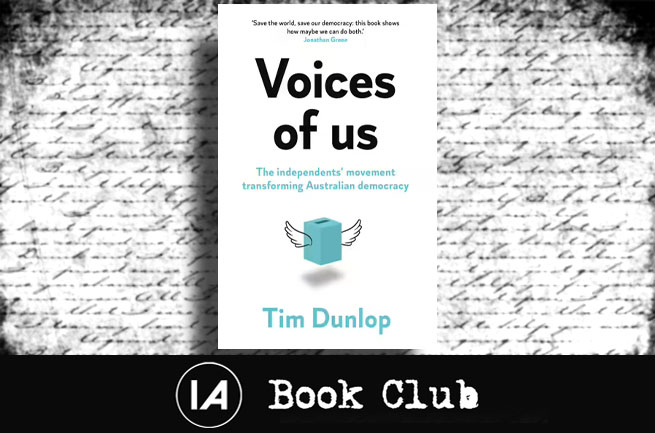Romaine Rutnam reviews a new book by Tim Dunlop, encouraging electoral change beyond two-party politics to aid the much-needed transformation of Australian democracy.
THIS IS INDEED a timely book released on 1 December 2022, just before the end of the year which saw a change of Federal Government after nearly a decade.
Tim Dunlop’s 211-page book, Voices of Us: The independents' movement transforming Australian democracy, has an informative table of contents book-ended by its ‘Introduction: The transformation of Australian politics, one kitchen table at (sic) time’ and ‘Conclusion: Raising the voices of us’.
There are four chapters, divided into three parts:
‘Part One: Zali and the zeitgeist
- 'Experts for means. Citizens for ends’
‘Part Two: How we got to 2022’
2. ‘Insiders and outsiders: The dispute at the heart of Australian politics'
3. ‘Beyond two-party politics and the captured state’
‘Part Three: In the middle, somewhat elevated’
- ‘When the country changes: Reforming democracy for a new era.’
I found the book’s first page fascinating because it reminded me how galvanised I had been by ‘the Voices4indi model (kitchen table conversations [ktc] etcetera), where they managed to vote in Cathy McGowan...’ This was mentioned in the text of a private message Dunlop received via his Facebook page in April 2018, inviting his involvement in the Voices of Warringah (VoW) movement.
VoW eventually saw the defeat of former Prime Minister Tony Abbott by the Independent Zali Steggall in 2019, who was subsequently re-elected in this year’s momentous May vote.
This book informed me that the ktc model was
'... built on community engagement work done by the Victorian Women’s Trust [VWT] as part of the Purple Sage and Watermark projects, in which many members of Australian Women in Agriculture had participated.'
Dunlop acknowledges the role played by Mary Crooks, VWT's executive director of 25 years.
Crooks is/was a hero of two of my dearest friends from my Victoria and Canberra days. It was when I got to page 64 that I first started to notice that the haste with which this book appears to have been written and published had some drawbacks, at least for me.
Here Dunlop mentions ‘The idea of Australia...’ without acknowledging, in that context, the superb book of the same title published earlier in 2022 by Julianne Schultz.
There is no bibliography, which I can understand for a small book clearly aimed at encouraging the formation of more "voices of" groups around Australia which might use this as a guide.
Dunlop’s chapter on ‘Insiders and Outsiders’ I found particularly useful for its discussion of the history of Australian citizenship and the fact that the Australian Constitution does not mention either citizenship or citizens.
It charts the moves in our political discourse from the elite-popular divide to insiders and outsiders.
On page 93, Dunlop writes:
When I was invited to speak with the various Voices Of groups, we discussed the idea of citizenship, and I argued that they had more in common with a version derived from the Greek city-state. I argued that democracy is self-rule, not rule by political parties... Parties are not mentioned in the constitutions of any major democracy: not in ours, the American, the French or the Canadian...
The French philosopher Simone Weil wrote a treatise against political parties in the wake of World War II, saying "If one were to entrust the organisation of public life to the devil, you could not invent a cleverer device than the political party."
The rest of this chapter includes useful references to the report 'Confronting State Capture' by Australian Democracy Network and the role played in the lead-up to the 2022 Federal Election by:
‘... a lot of journalists, many of whom had either retired or been made redundant in the downsizing of the industry... since at least the 1980s, or who had set up shop as freelancers or independent journalists with their own websites and social media presences.'
Dunlop also writes:
‘More than ever, then, we need a "voices of journalism" movement... but involving audiences as much as they possibly can’.
His fourth chapter details three urgent electoral changes to be considered and put into practice by the new Independent MPs: gaining support for campaign finance reform, proportional representation for the Lower House and ‘sortition — allow [ing]as many people as possible to deliberate on democratic outcomes’.
It is a mighty challenge, but I wish the author and this book great success in sales and influence. I shall promote it via the newly formed The Central Coast Voice.
'Voices of Us: The independents' movement transforming Australian democracy’ is available from Booktopia for $22.50 (paperback) RRP.
This book was reviewed by an IA Book Club member. If you would like to receive free high-quality books and have your review published on IA, subscribe to Independent Australia for your complimentary IA Book Club membership.
Romaine Rutnam is a retired public health policy analyst. She is active in Dying with Dignity NSW and many other advocacy organisations for healthy social change.
Related Articles
- Independents spit the dummy over Albanese's staff cuts proposal
- Independents: The best chance for a federal ICAC
- Australia’s political culture is failing, so elect independents
 This work is licensed under a Creative Commons Attribution-NonCommercial-NoDerivs 3.0 Australia License
This work is licensed under a Creative Commons Attribution-NonCommercial-NoDerivs 3.0 Australia License
Support independent journalism Subscribe to IA.














